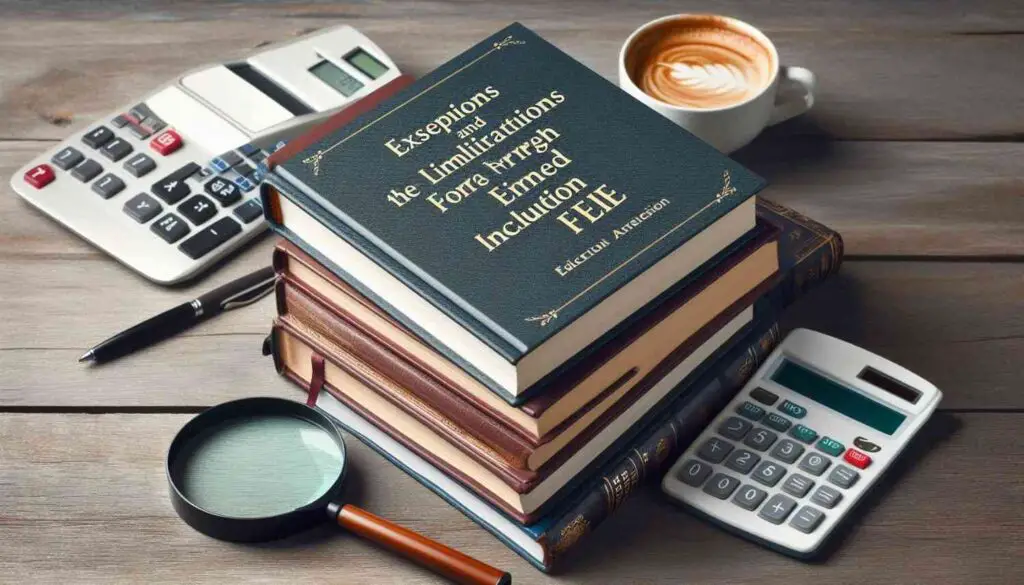Discover Foreign Earned Income Exclusion for US Expats. Learn eligibility requirements, calculation methods, and filing procedures to maximize your tax savings abroad.
Foreign Earned Income Exclusion for US Expats

As an American living and working abroad, the Foreign Earned Income Exclusion (FEIE) can be a valuable tax benefit that you may be eligible for.
This provision allows you to exclude a significant portion of your foreign-sourced income from your United States federal income tax return, potentially saving you thousands of dollars each year.
Understanding the nuances of the FEIE and how to properly claim it can be crucial for US expats looking to maximize their tax savings.
In this comprehensive article, we’ll dive deep into the details of the FEIE, including who qualifies, the eligibility requirements,
how to calculate the exclusion amount, and strategies for making the most of this tax-advantaged opportunity.
Understanding the Foreign Earned Income Exclusion (FEIE)
The FEIE is a tax provision that enables qualifying US citizens and resident aliens living abroad to exclude a portion of their foreign-earned income from their US taxable income.
This can help alleviate the burden of paying taxes in both the US and your country of residence, as it allows you to reduce your overall tax liability.
The rationale behind the FEIE is to acknowledge the unique circumstances
and challenges faced by American expats, who often incur additional expenses and complications due to their overseas living arrangements.
By providing this exclusion, the US government aims to make it more feasible for US citizens to live and work abroad without being doubly taxed.
Who Qualifies for the FEIE?
To qualify for the FEIE, there are a few key criteria you must meet:
- US Citizenship or Resident Alien Status: First and foremost, you must be a US citizen or a resident alien (green card holder) in order to be eligible for the FEIE.
- Foreign Tax Home: Your tax home must be in a foreign country, meaning that your regular or principal place of business or employment is located outside the United States. This does not necessarily mean that you must be a resident of the foreign country, but your primary place of work must be there.
- Physical Presence Test or Bona Fide Residence Test: In addition to having a foreign tax home, you must also satisfy either the Physical Presence Test or the Bona Fide Residence Test to claim the FEIE.
The FEIE Requirements
Physical Presence Test
The Physical Presence Test requires you to be physically present in a foreign country or countries for at least 330 full days (a
“full day” is defined as a 24-hour period that starts at midnight) during a 12-month period.
This 12-month period does not have to coincide with the calendar year, but can be any consecutive 12-month span.
It’s important to note that the 330 days do not have to be consecutive; they can be spread out over the course of the 12-month period.
Additionally, the days spent in the US or any other country during that time do not count towards the 330-day requirement.
Bona Fide Residence Test
The Bona Fide Residence Test requires you to be a bona fide resident of a foreign country or countries for an uninterrupted period that includes an entire tax year.
This means that you must establish a legitimate, long-term residence in a foreign country, with the intention of staying there for an extended period of time.
Unlike the Physical Presence Test, the Bona Fide Residence Test does not have a specific number of days requirement.
Instead, it’s a more holistic assessment of your overall living situation and intentions.
Factors such as the nature and length of your stay, the purpose of your presence in the foreign country, and the degree of
your integration into the local community are all considered when determining if you meet the bona fide residence criteria.
Calculating the FEIE Amount
The FEIE allows you to exclude up to a certain amount of your foreign-earned income from your US taxable income.
For the 2023 tax year, the maximum FEIE amount is $12,200.
It’s important to note that the FEIE is not a deduction, but rather an exclusion.
This means that the income you exclude from your taxable income through the FEIE will not be subject to US federal income tax, but it will also not be counted towards any deductions or credits you may be eligible for.
Claiming the FEIE on Your Tax Return
To claim the FEIE, you must file IRS Form 2555 (Foreign Earned Income) along with your annual US tax return.
This form requires you to provide detailed information about your foreign residency, income, and eligibility for the exclusion.
The process of claiming the FEIE can be somewhat complex, as you’ll need to track and report your foreign-earned income, as well as demonstrate that you meet the physical presence or bona fide residence requirements.
It’s crucial to ensure that you complete the Form 2555 accurately and provide all the necessary supporting documentation to avoid any issues with the IRS.
Also Read – Tax Credits for Energy-Efficient Home Improvements: A Comprehensive Guide
Additional Considerations for the FEIE
Housing Exclusion/Deduction
In addition to the FEIE, you may also be able to claim a housing exclusion or deduction for your foreign housing expenses.
This can further reduce your US tax liability by allowing you to exclude or deduct a portion of the costs associated with your overseas living accommodations.
Self-Employment Tax
If you are self-employed, it’s important to understand that you will still be subject to US self-employment tax on your foreign-earned income, even if you claim the FEIE.
This means that you will need to pay both the employee and employer portions of the self-employment tax, which can be a significant expense.
Combining the FEIE with the Foreign Tax Credit
Depending on your specific tax situation, you may have the option to claim the FEIE, the foreign tax credit, or a combination of the two.
The foreign tax credit allows you to offset your US tax liability by the amount of income taxes you’ve paid to a foreign government.
Carefully evaluating the pros and cons of each approach can help you maximize your overall tax savings.
Exceptions and Limitations of the FEIE
While the FEIE can be a powerful tax-saving tool for US expats, it’s important to be aware of its exceptions and limitations:

Income Earned in the United States
The FEIE only applies to foreign-earned income. Any income you earn from US sources, such as a US-based employer or investments, does not qualify for the exclusion.
Income Earned from US Sources
Similarly, income that is considered to be earned from US sources, such as self-employment income or income from a US-based business, also does not qualify for the FEIE.
Income Excluded from FEIE
Certain types of income, such as government wages, pensions, and Social Security benefits, are not eligible for the FEIE and must be included in your US taxable income.
Strategies for Maximizing the FEIE
To make the most of the FEIE, there are several strategies you can consider:
Timing Your Moves
Carefully planning your moves and foreign residency can help you maximize the FEIE and ensure you meet the eligibility requirements.
For example, if you’re considering a move abroad, timing it to coincide with the start of a new tax year can make it easier to satisfy the physical presence or bona fide residence tests.
Maintaining Compliant Tax Filings
It’s crucial to maintain compliant tax filings, both in the US and in your country of residence, to avoid any issues with the FEIE.
This includes timely filing of your tax returns, as well as proper documentation and reporting of your foreign-earned income and activities.
Consulting with a Tax Professional
Working with a tax professional who specializes in expatriate taxes can be invaluable when it comes to navigating the complexities of the FEIE.
They can help you understand the eligibility requirements, identify strategies for maximizing your tax savings, and ensure that your FEIE claims are properly documented and submitted.
Frequently Asked Questions (FAQs)
What is the maximum amount of the Foreign Earned Income Exclusion (FEIE) for 2023?
The maximum FEIE amount for the 2023 tax year is $12,200.
How do I qualify for the FEIE?
To qualify for the FEIE, you must be a US citizen or resident alien and either pass the Physical Presence Test or the Bona Fide Residence Test.
Can I claim both the FEIE and the foreign tax credit?
Yes, you can choose to claim the FEIE, the foreign tax credit, or a combination of the two, depending on your specific tax situation.
Does the FEIE apply to self-employment income?
Yes, the FEIE can be applied to self-employment income, but you will still be subject to US self-employment tax on that income.
What types of income are excluded from the FEIE?
Certain types of income, such as government wages, pensions, and Social Security benefits, are not eligible for the FEIE.
As an American living and working abroad, the Foreign Earned Income Exclusion can be a valuable tool for reducing your overall tax burden.
By understanding the eligibility requirements, calculating the exclusion amount, and employing strategic planning
, you can maximize the benefits of the FEIE and keep more of your hard-earned money in your pocket.
Remember to consult with a tax professional who specializes in expatriate taxes to ensure you are taking full advantage of this important tax provision.


1 thought on “Foreign Earned Income Exclusion for US Expats”